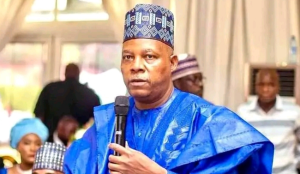Vice President Kashim Shettima has called for rapid scale up of energy production to enhance economic transformation of Nigerians.

Shettima stated this on Friday, May 24, 2024, at the Energy Transition Symposium with the theme: “Energy Transition in an Oil- Dependent Economy” in Abuja.
The symposium was organised by Development Agenda Magazine, with support from the Ford Foundation.
The vice president was represented by Mr Sadiq Wanka, the Special Adviser to the President on Power and infrastructure.
He said 45 per cent of Nigerians lacked access to electricity, emphasising the need for rapid economic development that would enhance the livelihood of Nigerians.
He said there was also need for bold action to stem the deleterious impact of climate change.
“The urgency of improving the economic condition of Nigerians is clear.
“There are critical environmental and social considerations which if not adequately managed will actually hamper our ability to change the lives of millions of people for the better.
“Nigeria today has the highest rate of deforestation in the world, as people depend primarily on biomass for energy production.
“In the north, desert encroachments are threatening the livelihood of communities, especially around the Lake Chad Basin.”
The vice president added that the rising sea levels threatened coastal cities and communities in the south.
“The energy transition plan is very clear on the need for Nigeria to become a net zero economy by 2060, as it does so with a critical realisation that we must maximise our petroleum resources in the short term.
“This is to provide the base load energy that will turbo charge, in particular, the strong government drives to push hydrocarbon investments up to 2030.
“This administration has already made a number of notable interventions within its first year in office.
“This includes a specific tax credit and incentives for the development of Greenfield known associated gas,” he said.
The vice president said that the two-pronged strategy to pursue renewables, alongside oil and gas investments had also yielded notable results.
According to him, the results support overall energy transition, or climate change at stake. This seeks to mainstream climate action international plans and programmes.
“A renewed push toward hydroelectric power seeks to tap into the 14,000 Mega Watts of near-term hydropower potential. 700 Mega Watts gear with hydropower plans that just came online in 2024.
“The Nigerian education project supported by the World Bank and the African Development Bank connected over 7.5 million Nigerians to electricity through mini grids and tsunami systems,” he said.
He said that there have also been significant investments in local value chains, including solar panel assembly and lithium processing that have been announced or commissioned.
According to him, this is a critical and often understated aspect of the energy transition, supporting the energy transition locally and globally.
“But full implementation of the Nigerian energy transition would not be easy.
“It requires concerted efforts locally, and with international collaboration, to source financing, and to prepare the Nigerian workforce for a net zero economy,” he said.
Former Minister of Power, Barth Nnaji, in a remark, said the nation has natural gas amounting to about 206 trillion cubic feet of gas on the ground and if properly harnessed, it would boost revenue for development.
“We have to concentrate and know that natural gas is something that we must be able to focus and make use of,” minister said.
He added that Nigeria would become a powerful nation If the nation produced the gas for domestic use and exportation.
According to him, there is need for the country to invest on its natural resources and what it produces, the plans that it has from this means inter-diversification.
“If the western nation donates one billion dollars to the country, it will not solve its challenges.
“So, we have to concentrate and know that natural gas is something that we must be able to focus and make use of,” he said.
Also speaking, the convener of the programme, Mr Paddy Ezeala, said network of issues on energy brought about the programme to enable participants ask questions that would help the government navigate the process in the right direction.
He added that it would also help the corporate body to make the right choices that would help the platform know what to do,
“And also, to know what was happening, if we get it right, a lot of things will become better.
“Nigeria is a major oil producing country and it derives a substantial part of its revenue from sales of crude oil.
“Although, Nigeria has adopted gas as its transition energy. It will have to deal with a future when fossil fuels are no longer marketable. There’s going to be profound social and economic implication,” he said.
Ezeala, who is Publisher and Editor-in-Chief of Development Agenda Magazine, added that the symposium would therefore explore factors and opportunities for mitigating the expected negative effects on government’s energy transition programmes on Nigerians, including how to ensure that impacted communities are helped and how to secure justice for residents of those communities.
By Chinenye Offor
